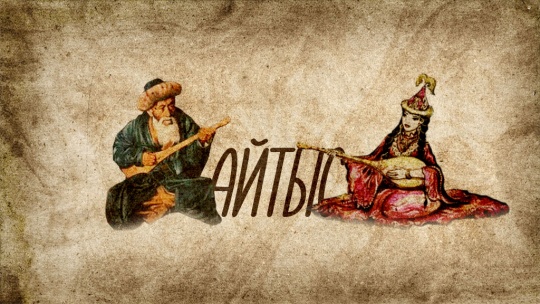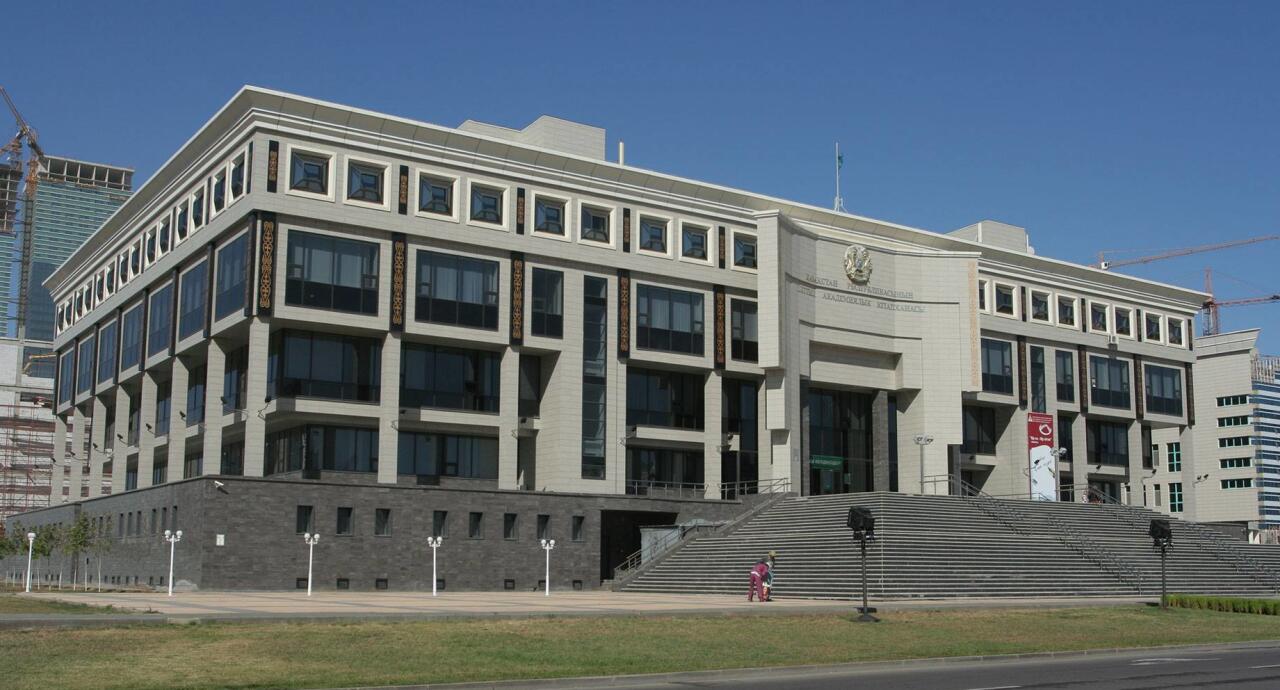Меню
Страницы
Статья
Literature
Ancient storytellers
Kazakh literary tradition has historically been rich in spoken literature expressed through a variety of genres, among them songs, poems, proverbs, tales and epics. As the population used to be predominantly illiterate, professional storytellers and musical performers – akyns – brought communities together, delighting audiences with the works of great authors, and often sharing their own improvised poems, stories and songs. The songs were often about heroic horsemen or lonely shepherds, and about battles between Kazakhs and Kalmyks and other rivals in the 16th century. Famous akyns include Birzhan-sal, Bukhar-zhyrau, Jambyl Jabayev, and Makhambet Otemisuly.

The earliest mention of aitys as a folklore genre can be found in the chronicles of the 11th- 12th centuries
Epic poems and songs have traditionally been handed orally from generation to generation. Older performers would teach and transmit their knowledge and skills to younger generations. Recitals and contests, known as aitys, have been popular forms of entertainment since at least the 11th century, and continue to be featured events at many festivals and gatherings today.
In 2015, aitys were added to UNESCO's List of the Intangible Cultural Heritage of Humanity. UNESCO noted that this art of improvisation continues to be a very popular cultural component of Kazakhstan's multi-ethnic society, and constitutes a vital part of the identity of bearer communities.
19th and 20th century literature
In the 19th century, Abai Kunanbaev was a poet and cultural reformer who played a large role in shaping modern Kazakh literary culture. His own work also helped to document and preserve traditional Kazakh culture, while his impressive translations allowed many Kazakhs to enjoy the works of various Russian and European authors for the first time. His major work, 'The Book of Words', was a philosophical treatise and collection of poems in which he encouraged fellow Kazakhs to embrace education and literacy. A monument commemorating his life was erected in front of the Palace of the Republic in Almaty in 1960.
The great writer Mukhtar Auezov grew up under the spiritual influence of Abai. He wrote numerous essays, short stories, and plays, published many articles and lectured at universities. In 1959, he was awarded the Lenin Prize for the novel 'The Way of Abai'.
Ilyas Yesenberlin looked to tell the history of Kazakhstan in his works, researching in depth the history of the nation. He studied scientific monographs, visited archives, and carefully studied primary sources. His is most known for his trilogy 'The Nomads', an epic which tells the story of some of the great battles that swept the territory now known as Kazakhstan in the 18th century. National pride and identity are central themes of the book.
Other famous Kazakh writers and poets include Ybyrai Altynsarin, Akhmet Baitursynov, Saken Seifullin, Shoqan Walikhanov, to name a few.
Kazakhstan has also provided inspiration to some of the greatest novelists across the world. Dostoyevsky was exiled to Kazakhstan, spending five years doing forced military service in the city of Semey. It is here that he began writing 'The Brothers Karamazov'.
Modern Kazakh literature
A common theme uniting traditional and modern Kazakh literature is a fascination with travel and exploration. Nomadic culture has had a significant impact on the stories that are told. Nomads are characterised by an intense curiosity and desire to explore, and this is reflected in Kazakh stories. Characters across prose and poetry are often on the move, exploring new localities and meeting new people.

Olzhas Suleimenov
Popular recent literary works include 'The Language of the Letter' by Olzhas Suleimenov, and 'Last Duty' by Abdizhamil Karimuly Nurpeisov. Nurpeisov is the current People's writer of Kazakhstan.
Along with his own original works, Nurpeisov has translated into Kazakh writings by Anton Chekhov, Maxim Gorky, and Nazim Hikmet.
Kazakhstan continues to cherish and promote literature written by, and about, Kazakhs. As part of the Madeni Mura state programme designed by President Nazarbayev, 600 books were published, covering history, archaeology, ethnography and culture. Titles included 'World Philosophical Heritage', 'History of Kazakh Literature', and the 'Philosophical Heritage of the Kazakh People from Ancient Times to the Present Day'. The total number of books published exceeded 1.5 million.
In 2018, Nur-Sultan was home to the Eurasian Book Fair. The event brought together more than 155 publishing houses, international book sellers, and cultural and study centres from across the Commonwealth of Independent States, Europe and Asia.
Kazakh literature has also been gaining recognition at international book fairs. Fascinating works by the renowned Kazakh authors Herold Belger and Oralkhan Bokeev were presented earlier this year at the London Book Fair. The translations were carried out in association with the Kazakh PEN-Club, which has launched the 'Wethe Kazakh People' campaign, promoting English translations and publications of works by the most prominent Kazakh writers.
Libraries
The National Academic Library was opened in Nur-Sultan (then Astana) in 2005. It is home to around 150,000 books. Meanwhile, the electronic libraryKazNEB has more than 23,000 electronic copies of documents, and is increasing every year.

National Academic Library of Kazakhstan